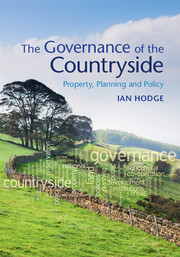Preface
Published online by Cambridge University Press: 05 February 2016
Summary
The countryside holds a special place in British national life. It represents a complex mix of values and associations. It is a place of food production, landscape, recreation, wildlife, residence and history. The land is largely owned by private owners, but the great majority of us feel some sort of ownership too. And so its governance has to be negotiated amongst many, often contradictory interests at many levels. It is an evolutionary story as different pressures and demands rise and fall in their impact on land and landscape.
This book sets out a broad canvas, drawing on ideas and evidence from a variety of disciplines such as economics, law, geography, politics and history. Our approach is grounded in the experience and practice in the UK: a focus on institutions necessarily places us in particular settings and with particular histories. The material is divided into five parts, starting with principles and context in Part I. Part II offers some histories, both to help us understand the present but also to reflect on the possibilities of alternative modes of governance in the future. We tend to take our world of private land ownership and individual proprietorships for granted. But it was not, and arguably need not, always be so. Part III looks at sectoral perspectives: agriculture, planning, landscape, conservation, public access and pollution. This is how our governance is usually organised. However, this perspective can miss the interactions between these areas, and Part IV looks at some cross-cutting approaches: markets, collective action and land ownership. Finally, Part V draws together some themes and looks to the future.
The book may be read in different ways. There is a logical progression from the beginning and that is the way in which the reader will get most from it. However, I hope that the chapters are sufficiently clear, making them assessable individually so that the book can be used as both a text as well as a resource for those working in particular areas, such as in the public or voluntary sectors.
Of course, all countries feel that their rural areas are special in particular ways, but there are aspects of the countryside in Britain that do give it some wider significance as a case study for rural governance.
- Type
- Chapter
- Information
- The Governance of the CountrysideProperty, Planning and Policy, pp. viiPublisher: Cambridge University PressPrint publication year: 2016

